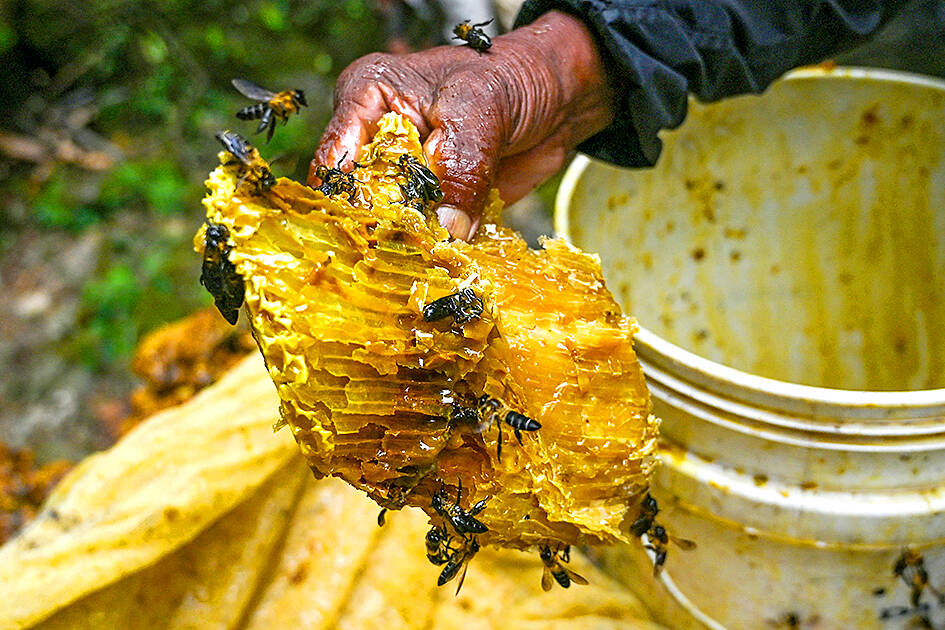Hanging from a rope-and-bamboo ladder off a Himalayan mountain cliff, skilled Nepali climbers gather highly prized hallucinogenic honey — an ancient tradition stung by environmental degradation and rapid climate change.
Wreathed in smoke to drive away defensive clouds of giant bees, 26-year-old Som Ram Gurung dangles dangerously 100 meters off the ground, slicing off dark and dripping hunks of delicious honeycomb.
For as long as anyone can remember in villages of Lamjung district, collecting the honey was worth the risk.

Photo: AFP
The combs are valued as “mad honey,” sweetness with a sting in its tail that collectors say provides an intoxicating buzz with mild psychoactive properties derived from rhododendron nectar that the bees love.
It was never easy to harvest.
The high-altitude honey comes from the world’s largest honey bee species, Apis laboriosa, which favours inaccessible cliffs.
But the skilled craft is now beset with extra challenges, many driven by the increasing effects of a heating planet.
Honey hunters say shifting weather patterns and environmental threats are impacting their remote forested valleys, 100km northwest of Kathmandu.
Doodh Bahadur Gurung, 65, who taught his son Som Ram his skills, said hunters had seen a rapid slump in the number of hives and amounts of honey harvested.
“When we were young, there used to be beehives on almost all cliffs because of the abundance of wildflowers and water sources,” said Doodh Bahadur.
“But with each passing year, it’s becoming harder to find hives.”
DAMS, PESTICIDES, WILDFIRE
He blamed the decline in bees on increasingly irregular rainfall, wildfires, agricultural pesticides and the diversion of rivers due to a surge of hydropower dams and accompanying construction of roads.
“Streams are drying up due to hydro-projects and irregular rainfall,” he said, noting wild bees prefer to nest near water.
“Bees that fly to farms also face the problem of pesticides, which kill them.”
With erratic rain, drier winters and baking heat, bushfires have become more common.
Government data shows Nepal tackled over 4,500 wildfires this year, nearly double the year before.
“Wildfires are more common now,” Doodh Bahadur said. “There aren’t enough young people to douse them in time”.
A decade ago, his village of Taap could harvest 1,000 liters a season.
Today, Doodh Bahadur said they count themselves lucky to get 250 liters.
The hunters’ observations are confirmed by scientists.
They say rising temperatures due to fossil-fuel-driven climate change is a key factor.
“Bees... are highly susceptible to changing temperatures,” said bee specialist Susma Giri, from the Kathmandu Institute of Applied Sciences.
“They are wild creatures and can’t adjust to human movements or noise, which directly affects wild bees.”
‘ALARMING ECONOMIC CONSEQUENCES’
ICIMOD rang the alarm in May, noting at least 75 percent of Nepal’s crops depend on pollinators such as bees.
“Among the key factors for their decline... are climate change and loss in habitats,” ICIMOD said.
“The reduced pollination that ensues has already had alarming economic consequences.”
A 2022 study, in the journal Environmental Health Perspectives, calculated annual losses from reduced pollination in Nepal amounted to as much as US$250 per capita — a massive sum in a country where annual average income is US$1,400.
Shrinking supplies means the rare honey commands high prices.
A liter that sold for US$3.5 per liter two decades ago now sells for US$15.
Traders say there is increasing demand from the United States, Europe, and Japan, fueled by its reported health benefits on social media.
Honey traders in Kathmandu estimate annual exports to be around 10,000 liters, and internationally, a 250-gram pot of “mad honey” can command prices of US$70 online.
“The demand for ‘mad honey’ increases yearly, but quality production has decreased,” said Kathmandu-based honey exporter Rashmi Kandel.
‘LOSING EVERYTHING’
With honey drying up, fewer young people want to join the traditional month-long mountain hunt.
Across Nepal, young people are leaving rural life, seeking better-paid jobs abroad.
Suk Bahadur Gurung, 56, a local politician and part of the honey hunting team, is gloomy the next generation will follow the trade.
“You need skills and strength,” Suk Bahadur said. “There aren’t many youths who want to do it.”
Som Ram Gurung held out his swollen arms and legs after descending from the cliff.
“Stings cover my body,” he said, adding he is due to take up a factory job in Dubai with a monthly salary of around US$320.
His father Doodh Bahadur laments both the dwindling bees and the departing youth.
“We’re losing everything,” he said. “The future is uncertain for everyone.”

Under pressure, President William Lai (賴清德) has enacted his first cabinet reshuffle. Whether it will be enough to staunch the bleeding remains to be seen. Cabinet members in the Executive Yuan almost always end up as sacrificial lambs, especially those appointed early in a president’s term. When presidents are under pressure, the cabinet is reshuffled. This is not unique to any party or president; this is the custom. This is the case in many democracies, especially parliamentary ones. In Taiwan, constitutionally the president presides over the heads of the five branches of government, each of which is confusingly translated as “president”

Sept. 1 to Sept. 7 In 1899, Kozaburo Hirai became the first documented Japanese to wed a Taiwanese under colonial rule. The soldier was partly motivated by the government’s policy of assimilating the Taiwanese population through intermarriage. While his friends and family disapproved and even mocked him, the marriage endured. By 1930, when his story appeared in Tales of Virtuous Deeds in Taiwan, Hirai had settled in his wife’s rural Changhua hometown, farming the land and integrating into local society. Similarly, Aiko Fujii, who married into the prominent Wufeng Lin Family (霧峰林家) in 1927, quickly learned Hoklo (commonly known as Taiwanese) and

The Venice Film Festival kicked off with the world premiere of Paolo Sorrentino’s La Grazia Wednesday night on the Lido. The opening ceremony of the festival also saw Francis Ford Coppola presenting filmmaker Werner Herzog with a lifetime achievement prize. The 82nd edition of the glamorous international film festival is playing host to many Hollywood stars, including George Clooney, Julia Roberts and Dwayne Johnson, and famed auteurs, from Guillermo del Toro to Kathryn Bigelow, who all have films debuting over the next 10 days. The conflict in Gaza has also already been an everpresent topic both outside the festival’s walls, where

The low voter turnout for the referendum on Aug. 23 shows that many Taiwanese are apathetic about nuclear energy, but there are long-term energy stakes involved that the public needs to grasp Taiwan faces an energy trilemma: soaring AI-driven demand, pressure to cut carbon and reliance on fragile fuel imports. But the nuclear referendum on Aug. 23 showed how little this registered with voters, many of whom neither see the long game nor grasp the stakes. Volunteer referendum worker Vivian Chen (陳薇安) put it bluntly: “I’ve seen many people asking what they’re voting for when they arrive to vote. They cast their vote without even doing any research.” Imagine Taiwanese voters invited to a poker table. The bet looked simple — yes or no — yet most never showed. More than two-thirds of those